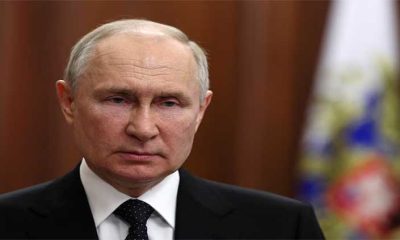The world’s trade ministers gathered in the UAE on Monday for a high-level WTO meeting with no clear prospects for breakthroughs, amid geopolitical tensions and disagreements.
The World Trade Organisation’s 13th ministerial conference (MC13), scheduled to run until Thursday in Abu Dhabi, the capital of the United Arab Emirates, is the first in two years.
The WTO is hoping for progress, particularly on fishing, agriculture and electronic commerce.
But big deals are unlikely as the body’s rules require full consensus among all 164 member states — a tall order in the current climate.
“I don’t have hopes that a very substantive agreement will be announced,” said Marcelo Olarreaga, Professor of Economics at the University of Geneva.
“My impression is that the negotiators are dealing with tactical positions – how to make it look like it is the other (side) who is blocking negotiations,” he told AFP.
Even WTO Director-General Ngozi Okonjo-Iweala has said she expects the meeting to be challenging due to the “economic and political headwinds” – from the war in Ukraine, attacks in the Red Sea, inflation, rising food prices and economic difficulties in Europe and China.
Her team is working around the clock to draft agreements for the talks, she told journalists this month, noting that “negotiating positions are still quite tough”, notably on agriculture.
‘Miracle’
During the WTO’s last ministerial meeting, held at its Geneva headquarters in June 2022, trade ministers nailed down a historic deal banning fisheries subsidies harmful to marine life and agreed to a temporary patent waiver for Covid-19 vaccines.
They also committed themselves to re-establishing a dispute settlement system which Washington had brought to a grinding halt in 2019 after years of blocking the appointment of new judges to the WTO’s appeals court.
“Replicating the success, the miracle, of MC12 in 2022 will be extremely challenging,” European Trade Commissioner Valdis Dombrovskis said this month.
“Negotiations on the big-ticket items” – such as fisheries, agriculture and the e-commerce moratorium – will “remain open until the final phase of the conference”, he added.
“Negotiations on dispute settlement reform and potentially some parts of the outcome document will also be challenging.”
However, the WTO faces pressure to eke out progress on reform in Abu Dhabi ahead of the possible re-election of Donald Trump as US president.
During his four years in office from 2017 to 2021, Trump threatened to pull the United States out of the trade body and disrupted its ability to settle disputes.
“There will be the US elections in November…so this is the last chance,” a diplomatic source in Geneva told AFP on condition of anonymity.
“Postponing anything until after MC13 is not a good strategy.”
Earlier this month, US Trade Representative Katherine Tai underlined Washington’s “commitment to reforming the WTO and creating a more durable multilateral trading system”.
But Olarreaga of the University of Geneva said the other members of the WTO “cannot expect huge concessions” from the administration of US President Joe Biden in an election year.
‘Fragmentation’
While there is doubt over progress at the WTO on major issues such as agriculture, there is hope for small advances on other fronts, particularly aid for developing countries.
On Monday, two new countries, the Comoros and East Timor, are expected to be accepted as WTO members.
More than 120 countries and regions, including China and the European Union, but not the United States, issued a ministerial declaration early Monday, marking the finalisation of an agreement aimed at facilitating international investments in development.
They also issued a submission requesting the official integration of the deal into the WTO, but some diplomats fear opposition from India, which rejects any agreement that does not include all member states.
But amid the difficulty of obtaining full consensus, more and more plurilateral agreements — deals with a narrower number of signatories — are being reached, applying only to the participating countries.
Adding to the challenges for those gathering in the UAE, is the ongoing war in Gaza and related attacks by Yemeni rebels on ships in the Red Sea, a campaign that has disrupted global maritime trade.
“The current situation is characterised by geopolitical tensions,” said a European diplomat who spoke to AFP on the condition of anonymity.
“High expectations from developing nations following the financial crisis and the Covid-19 pandemic, as well as economic tensions due to inflation… (add to the) risk of fragmentation of the global economy,” the diplomat said.
Post Views: 42


 Fashion3 months ago
Fashion3 months ago
 Sports3 months ago
Sports3 months ago
 Sports3 months ago
Sports3 months ago
 Fashion2 months ago
Fashion2 months ago
 pakistan3 months ago
pakistan3 months ago
 World3 months ago
World3 months ago
 pakistan3 months ago
pakistan3 months ago
 Tech3 months ago
Tech3 months ago



















